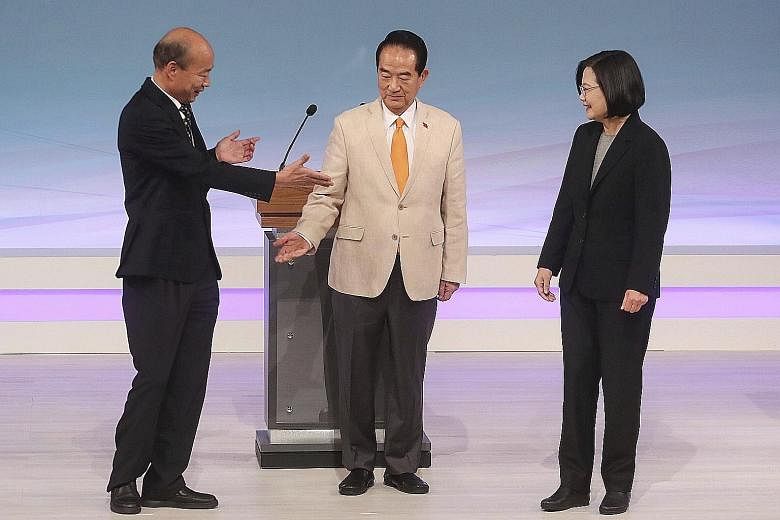Taiwan's three presidential candidates did not hold back in denouncing one another in the final TV debate before the Jan 11 elections, with much of the criticism focusing on how they might handle Taiwan-China relations.
After personal remarks by each of the candidates, it was the turn of the journalists to ask questions. The candidates discussed China, expanding diplomatic ties, boosting the economy, defence policies and sustainability.
Kaohsiung Mayor Han Kuo-yu said he would not abandon his supporters if elected and that he planned to spend half of his time in the southern city. The presidential office is in Taipei, in the north.
The remarks came after many citizens signed a petition to begin a process to recall Mr Han from his position as mayor after he joined the presidential race.
Mr Han, from the opposition Kuomintang (KMT), said he would protect the island's sovereignty and its constitutional system, and then spent much of his debate time slamming President Tsai Ing-wen's Democratic Progressive Party as the "biggest betrayer of Taiwan's sovereign rights".
When asked by his opponents how he planned to protect Taiwan's de facto autonomy, Mr Han said: "Why are we still discussing 'one country, two systems'?"
He maintained he did not support the policy despite flip-flopping on the issue during his campaign.
People First Party chairman James Soong also pledged to protect Taiwan's rights and said that with him at the helm, Taiwan "will not be reduced to a pawn" in the face of major powers such as the United States, China and Japan.
Mr Soong acknowledged the joint history with China but said Taiwan had to better understand the mainland to pave the way for clear communication without sacrificing its democracy. "We need constructive talks and to avoid provoking violence," he added.
Ms Tsai repeated the need for Taiwan to present one united front when it came to China: "(The DPP) prioritises preventing China from taking back Taiwan, but a divided Taiwan cannot handle China's infiltration and threats."
She also hit out at Mr Han, saying he had yet to provide solid policies that people can depend on.
"We need a president whose knees will not buckle at the mere mention of China," she continued, referencing how Mr Han refused to name China as Taiwan's main oppressor when asked publicly by local comedian Brian Tseng.
Ms Tsai's two opponents questioned how her government had all but cut off communication with China, something she denied. "We don't provoke China, nor did we actively stop communication; it is China who has stopped tourists from coming to Taiwan," she said.
Mr Han has openly disapproved of the President's support for the protesters in Hong Kong, calling her a liar who did nothing to help the former British colony.
"Every Taiwanese citizen has a bomb around their neck, the controller (is) in Tsai's hand... She's using Hong Kong's anti-extradition protests and Taiwan's anti-infiltration Bill to threaten people to vote for her," he said.
Mr Han also maintained that Ms Tsai and her government had "bought the loyalty of local media and enlisted an 'online army' as part of a huge smear campaign".
Ms Tsai responded by talking about how China had been infiltrating Taiwan's elections, and she credited China's netizens and bots with being the biggest help in getting Mr Han elected.
She also called on the other candidates to recognise how politicians had been targets of online bullying as a result.
Both Mr Han and Mr Soong criticised the DPP's insistence on passing the controversial anti-infiltration Bill, which prevents other governments - namely China's - from interfering with Taiwan's elections.

